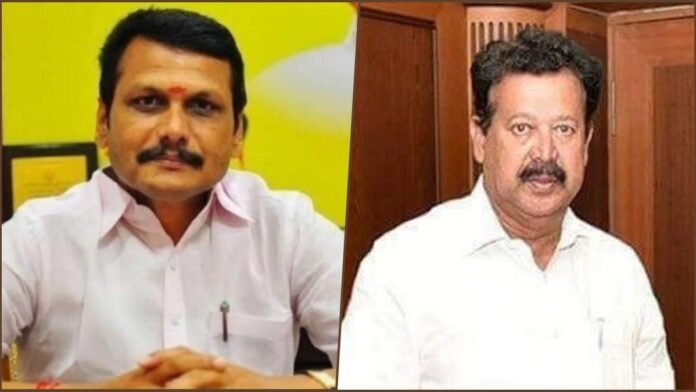
Key Points
- Electricity Minister Senthil Balaji and Forest Minister K. Ponmudy resigned on Sunday following mounting legal and political pressure.
- Balaji stepped down after a Supreme Court ultimatum tied to his bail in a money laundering case; Ponmudy resigned over a hate speech controversy.
- Their portfolios have been swiftly reassigned to other senior ministers; a new cabinet member, T. Mano Thangaraj, will be sworn in on Monday.
- The reshuffle is seen as Chief Minister M.K. Stalin’s move to distance his government from controversy ahead of the 2026 state elections.
- Opposition parties have intensified their criticism, while DMK defends the changes as a commitment to ethics and transparency.
Bengaluru: In a significant political development, Tamil Nadu’s Electricity Minister V. Senthil Balaji and Forest Minister Dr. K. Ponmudy resigned from their posts on Sunday, triggering a major cabinet reshuffle by Chief Minister M.K. Stalin. The resignations, accepted by Governor R.N. Ravi, come amid mounting legal scrutiny and political controversies that threatened to overshadow the DMK-led government’s image as it gears up for the 2026 Assembly elections.
Why Did Senthil Balaji and K. Ponmudy Resign?
Senthil Balaji:
Balaji, considered a key strategist for the DMK, was under investigation by the Enforcement Directorate (ED) for his alleged involvement in a cash-for-jobs scam during his tenure as Transport Minister in the previous AIADMK government. After spending 15 months in jail, he was released on bail by the Supreme Court in September 2024 and was re-inducted into the cabinet. However, the Supreme Court recently issued a stern warning, forcing Balaji to choose between retaining his ministerial post and his bail, with the threat of bail cancellation if he did not step down.
K. Ponmudy:
Ponmudy’s resignation followed a storm of controversy over derogatory remarks he made about Shaivite and Vaishnavite traditions and women during a public event. The comments sparked widespread outrage, with opposition parties demanding his removal. The Madras High Court took suo motu cognizance, labeling the remarks as “hate speech” and ordering an FIR and impartial investigation. Despite a public apology and removal from a key party post, the pressure for his ouster persisted.
Cabinet Portfolios Reassigned
Following the resignations, Chief Minister Stalin quickly reassigned the vacated portfolios to maintain administrative stability:
- SS Sivasankar (Transport Minister) now also handles the Electricity portfolio.
- S. Muthusamy (Housing Minister) has been given Prohibition and Excise.
- R.S. Rajakannappan (Milk and Dairy Development) takes over Forests and Khadi.
Additionally, former minister T. Mano Thangaraj will be re-inducted into the cabinet, with his swearing-in scheduled for Monday.
Political Reactions and Implications
The opposition, including AIADMK and BJP, has seized on the resignations to attack the DMK government, questioning its commitment to clean governance. The DMK, however, has defended the reshuffle as a demonstration of “ethics and transparency,” emphasizing its zero-tolerance policy towards corruption and misconduct.
Political analysts view the move as a strategic effort by Stalin to project stability, restore public confidence, and distance the administration from controversies that could impact the party’s prospects in the upcoming elections.
What’s Next?
With portfolios swiftly reassigned and new faces set to join the cabinet, the DMK aims to reinforce its image and administrative efficiency. Further changes could be on the horizon as the government continues to navigate legal and political challenges in the lead-up to the 2026 polls.




















































